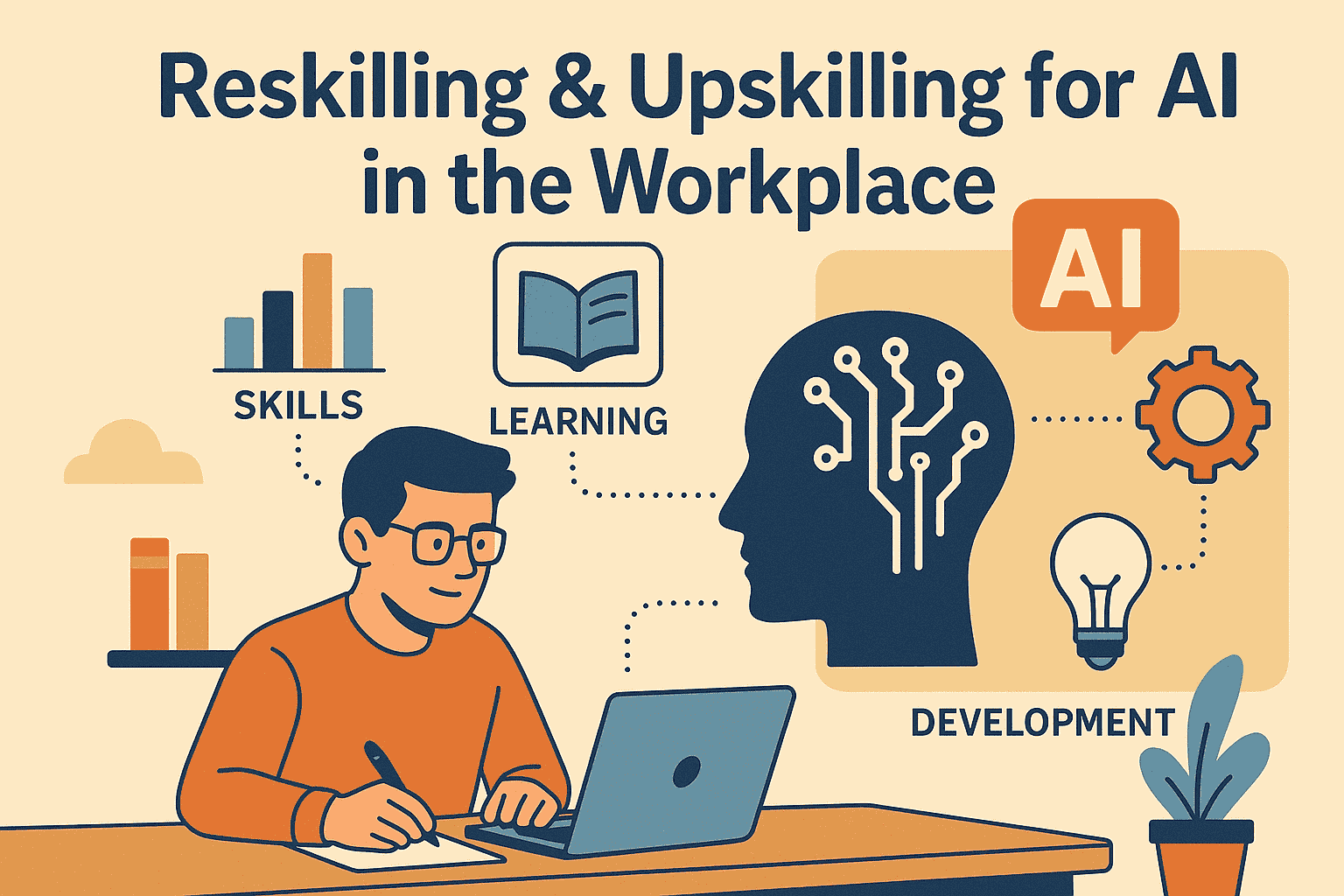Reskilling and Upskilling for AI in the Workplace: Why It Matters and How to Get Started
The rise of Artificial Intelligence (AI) is transforming the modern workplace at lightning speed. From automating repetitive tasks to enhancing decision-making with predictive analytics, AI is now embedded across nearly every industry — healthcare, finance, education, manufacturing, and beyond. While this evolution brings immense opportunities, it also poses a challenge: how do professionals stay relevant in a workforce increasingly shaped by AI?
The answer lies in reskilling and upskilling.
What is Reskilling vs. Upskilling?
-
Reskilling refers to learning new skills to transition into a different job or industry. For instance, a customer service representative might reskill to become a data analyst.
-
Upskilling means enhancing your current abilities to stay competitive in your existing role. For example, a marketing specialist might upskill by learning how to use AI-driven analytics tools.
Both strategies are essential in a future of work that is dynamic, digital, and data-driven.
Why AI Demands New Skills in the Workplace
1. AI is Replacing Routine Tasks
AI-powered automation is increasingly taking over repetitive, rule-based activities — from data entry and scheduling to customer queries. Employees who rely heavily on these tasks must pivot to value-driven roles requiring creativity, strategy, and emotional intelligence.
2. Human-AI Collaboration is the New Norm
Rather than replacing humans entirely, AI is becoming a co-pilot in many roles. This shift demands digital literacy, AI fluency, and adaptability — skills that most traditional education paths haven’t focused on until recently.
3. The Talent Gap is Growing
According to the World Economic Forum, 50% of all employees will need reskilling by 2025. Organizations now view employee learning not as a perk but as a critical investment in sustainability and innovation.
Key Skills Needed for the AI Era
While technical skills are valuable, soft skills remain indispensable. Here’s a breakdown of what professionals should focus on:
Technical Skills
-
Data literacy: Understanding how data is collected, cleaned, and interpreted
-
AI and machine learning basics: Even non-tech roles can benefit from foundational knowledge
-
Coding and automation tools: Languages like Python or tools like Power Automate
-
Cybersecurity awareness: Essential as digital processes increase
Human-Centric Skills
-
Critical thinking and problem solving
-
Emotional intelligence
-
Communication and collaboration
-
Adaptability and growth mindset
How to Start Reskilling or Upskilling for AI
1. Evaluate Your Current Skill Set
Start by identifying the gaps between your current role and the direction your industry is heading. Tools like AI-readiness assessments or LinkedIn’s skill analysis can help.
2. Set a Learning Path
Choose between reskilling (for a career shift) or upskilling (to advance in your current path). Then select a specific domain of AI or tech — e.g., automation, data analysis, prompt engineering, etc.
3. Leverage Learning Platforms
There’s no shortage of affordable (even free) resources:
-
Coursera, edX, and Udemy
-
Google’s AI and machine learning courses
-
Microsoft Learn and IBM SkillsBuild
4. Practice Through Projects
Apply your learning in real-world scenarios. For example, use ChatGPT to streamline daily reports or create a chatbot for customer service. Portfolio-based evidence is increasingly as valuable as certificates.
5. Network and Collaborate
Join AI communities, attend webinars, and collaborate on open-source or internal projects. Learning through peer interaction often accelerates growth.
For Employers: Investing in Employee AI Readiness
Forward-thinking organizations should build a culture of continuous learning:
-
Offer on-the-job training
-
Create internal bootcamps and certifications
-
Recognize and reward learning milestones
-
Provide time during work hours for skill development
Companies that invest in AI upskilling are more agile and better prepared to harness innovation.
Final Thoughts
AI is not here to replace us — it’s here to redefine how we work. Those who embrace reskilling and upskilling today are the leaders, creators, and problem-solvers of tomorrow. Whether you're a seasoned executive or just starting your career, investing in AI-driven capabilities isn’t optional anymore — it’s essential.
The future belongs to the adaptable.









